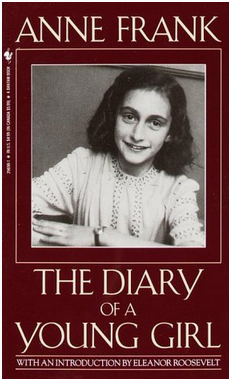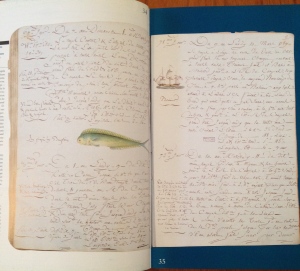Anne Frank’s diary is arguably the best-known, most-widely-read diary in the world. I suspect that for many readers Frank’s diary is an introduction to the form, perhaps an inspiration for writing their own diaries. From Frank’s diary, they would learn about dailiness, about the letter-diary hybrid, and, of course, about the powerful combination of ordinariness and pathos.

Frank’s Diary has been in the news recently because of two intertwined controversies: the question of whether or not her father, Otto Frank, can legitimately be considered co-author of the Diary; and the question of whether or not the copyright on the Diary has expired, allowing the text to enter the public domain.
That Otto Frank played a significant editorial role in the production of the published Diary has long been understood by both scholars and general readers. My copy of the Diary identifies him as editor on the cover (along with Mirjam Pressler). But Otto’s editorial role has come under further scrutiny around the question of whether “editor,” in this instance, equates with “co-author.”
While the debate may be new to Frank Studies, this is a question commonly confronted by literary critics, particularly around texts in which an editor/amanuensis possessed greater power or social status than the author/subject. In my Life Writing classes last semester, we studied the Memoirs of Elleanor Eldridge (1838), which precisely exhibits these conditions: authored by a white woman, Frances H. Whipple, the memoir recounts the life of a mixed race (indigenous, African American) woman, Eldridge, who appears to have been illiterate. The contemporary editor of this recovered text, Joycelyn Moody, makes the provocative claim that Whipple and Eldridge should be considered co-authors, thereby upsetting the expected characterization of the (white, powerful) editor stealing and suppressing the voice of the (non-white, disempowered) subject (which is how texts of this kind have often been interpreted by literary critics). My students and I struggled with this characterization — we had many productive but unresolved conversations about what it would mean to consider these two women co-authors, what the implications were for the definition of authorship, whether or not Eldridge could be considered to be “speaking” through the text, etc. These discussions have been on my mind as I’ve been reading about the Otto Frank issue: What does it mean to view Otto as Anne’s co-author? There are similar issues regarding power and authority: Otto is male, adult, and living; Anne is female, young, and deceased; obviously, she does not have the ability to control or craft her text. To move Otto from editor to co-author appears to reinforce this power dynamic, to further Anne’s marginalization within or through her own life writing. It also calls into question the accuracy and legitimacy of the text itself — a question that always hovers around published diaries, but one that is particularly exacerbated when an editor (or co-author?) has played a role in bringing the text to the public view.
The claim that Otto is co-author is made by the Swiss foundation, Anne Frank Fonds — a fact steeped in irony. You would think that the Fonds would have the strongest stake in affirming the authenticity of Frank’s Diary, which appears to be eroded by the “co-authorship” claim. Yet, the Fonds also has a strong financial interest in extending the copyright of Frank’s book. According to European law, copyright expires 70 years after the death of the author. As a result, Frank’s Diary should enter the pubic domain on January 1, 2016. But, if Otto is a co-author, the copyright would be extended until 2050. Hence the counter-claim, the lawsuits, and the controversy.
As I understand it, the co-authorship claim did not prevent several Dutch editions of Frank’s Diary from being posted on the internet on January 1, 2016. English (and other language) editions remain copyrighted according to the date of their translation and publication.
It’s the interpretive questions that this debate raise that interest me: If a diary is edited after the diarist’s death, under what circumstances can/should the editor be considered a co-author? And, if the diary is considered co-authored, is it still a diary? Does it still possess the status of truthful authenticity that diaries are expected to have? Extending these questions from Frank’s Diary to other published diaries is, I think, a necessary step for those of us interested in the past and future of the diary genre.
For further reading:
“Anne Frank Foundation fights plans to publish diary online” (The Guardian)
Cory Doctorow, “Anne Frank’s diary is in the public domain” (Boing-Boing)
Rich McCormic, “Anne Frank’s diary is now in free to download” (The Verge)
Quill & Quire posted competing op-eds, for and against the co-authorship claim: John Degan FOR and Michael Wolfe AGAINST





















